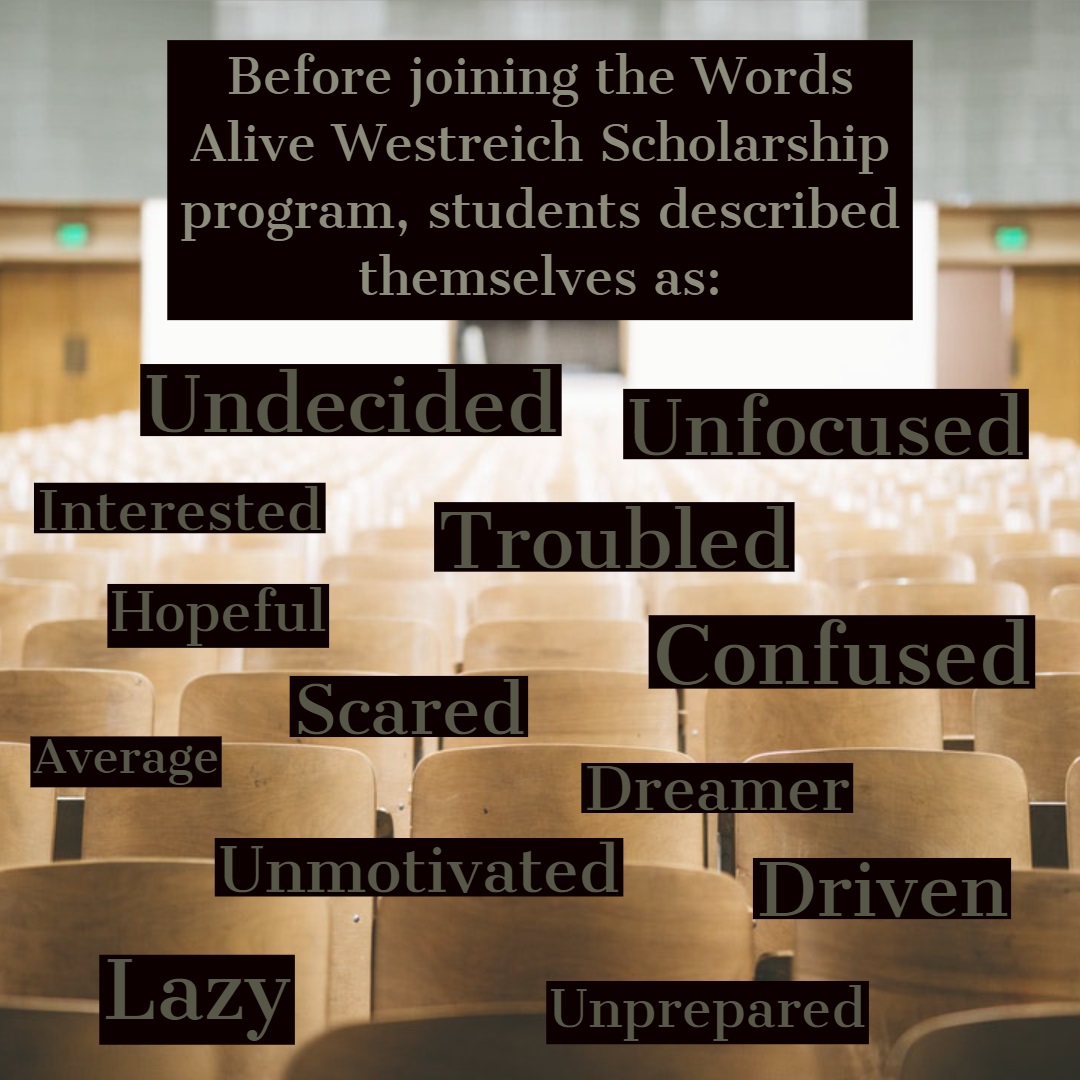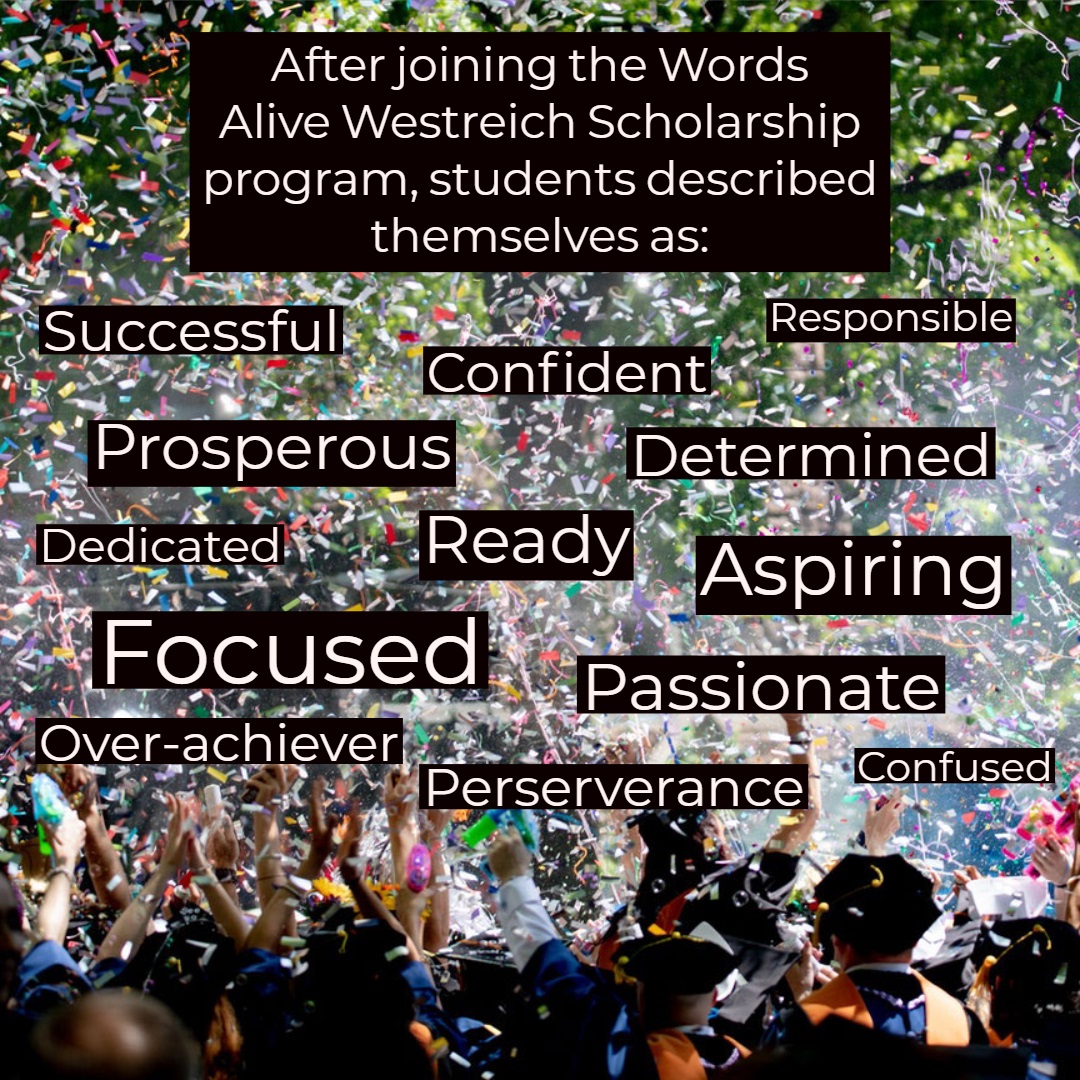An image of our WAWS scholar Paulina (right) hugging her friend, who presented Paulina’s reward at the 2018 WAWS Award Ceremony.
To continually provide meaningful and evaluation-driven programming, Words Alive commenced on a seven-month Dialogues in Action (DIA) project to analyze the impact of our Words Alive Westreich Scholarship (WAWS) program using a blended qualitative and quantitative evaluation model. Through this process, we had an opportunity to view our program through the lens of the scholarship recipients, past and present, and their mentors to determine opportunities to enhance our program delivery.
Throughout this process, we identified eight findings and then brainstormed ways we could update and improve the program based on these findings. Here is the fifth finding!
“I feel like a better person. I feel so free.”
While the intended impacts of the program included relationship-building with others, one surprising result discovered during this study was participants’ changing relationship with themselves.
Through their scholarship application essays and interviews for this study, most, if not all, of the students discussed the trauma in their lives. It’s no secret that an unstable childhood can contribute to unhealthy personal relationships in adulthood. Many of the students revealed abusive romantic partners, the inability to enforce boundaries with their family members and feelings of isolation from peers who couldn’t relate.
However, through a consistent relationship with their mentor as described in Finding #3 and the support of their WAWS cohort as described in Finding #6, students developed and employed healthy relationship skills with others. According to this study, 85% of scholars surveyed said they felt more confident in putting healthy relationship skills into action. For one scholar, healthy relationship skills meant establishing and exercising new boundaries: “I’ve learned to say no to certain people.”
This new-found confidence coupled with realizing the value of healthy relationships, networking, community engagement and mentorship led to many students and their mentors saying that the students simply found themselves much more open to communication after participating in the program.
One mentor described this growth in her mentee as: “She does a good job at assessing people and choosing to be with people who are good examples. She has become very open with me.”
Perhaps even more impactful, however, was the growth scholars recognized within themselves. Many students initially felt trapped by the labels placed on them by society: at-risk, homeless, teen parent, juvenile delinquent. Before their participation in the program, many said they never thought they could go to college. In survey responses, they described themselves as “troubled, scared, lazy, unmotivated, unprepared and unfocused” before participating in the program.
But after at least a year in the program, they became scholars – describing themselves instead with more positive terms such as “responsible, confident, passionate, ready and focused.”
In-line with these terms alluding to a new sense of agency, scholars described taking action:
“I believe that I’m smart enough to accomplish my goals. I believe I’m capable of taking actions to make changes, that I can identify those actions, and make the changes. Most importantly, I believe in myself, that I’m the only person who can do this. I’ve learned to identify what the challenges are and be specific as you can be to make that challenge a goal, to make it a positive.” – Scholar, age 25
“I take action, go out and get the things that are beneficial for me instead of waiting for them to come to me.” – Scholar, age 26
For many program participants, that shift stems from the support of their mentor and Words Alive staff. In interviews with scholars, they said that having someone cheer them on made them not want to give up, helped them realize they could rise above their circumstances and see themselves as more capable.
One scholar said:
“I’ve grown so much. I appreciate hearing the uplifting things [my mentor and Words Alive staff] say. It helps me remember my accomplishments and not just my struggles. I feel like a better person; I feel so free.” – Scholar, age 26
Another scholar shared:
“I’ve learned self-care, self-love and self-respect...with self-love, especially when you have so many obstacles, helps everything else. Before I didn’t know any better. I’m pushing myself to ask questions and see how much I’ve accomplished. I’m reclaiming my identity as a teen mom, as undocumented. Before, I didn’t love myself, I just saw the labels society threw at me, like screw-up, outlaw, rebel and minority. I didn’t like waking up to that.” – Scholar, age 25
With a redefined, positive perspective of themselves and skills honed to address their circumstances, 100% of students surveyed said the program helped them feel at least moderately more in control of their choices.
To love oneself – to truly feel confident both in and out of one’s skin – is important if one is to break free from the trappings of harmful and limiting environments. That the program scholars develop that confidence in such dramatic ways is remarkable.
“I’m more positive about everything and learned to appreciate myself more. I wish I had a friend like me.” – Scholar, age 26
Significance
Focused on the expectations and labels placed on them by society, students often say they never imagined they would graduate high school let alone go to college. But as students are repeatedly and genuinely told, “you can do it,” our findings indicate they begin to believe it. This confidence translates to several other attributes, such as motivation and resilience, that help drive scholars’ success.
Equally, one’s desire to cultivate new relationships, create a personal goal of helping others, and confidently navigate the world fosters new opportunities. Being able to identify and develop in these two areas and recognize their importance will provide lasting positive impact.



